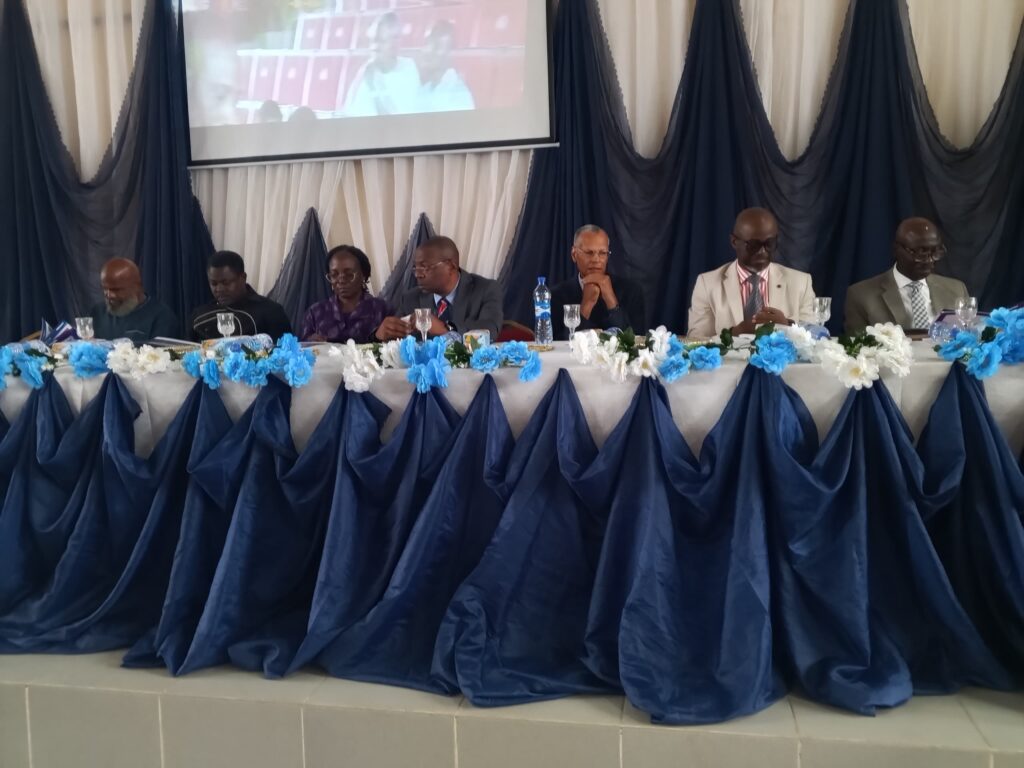The IFEMED Journal Club, on Thursday, October 30, held the 6th edition of the Professor Olikoye Ransome-Kuti Memorial Public Lecture. The lecture was themed ‘Reversing the Exodus: Retaining and Empowering Nigeria’s Healthcare Workforce’. The event was held at the College of Health Sciences Auditorium, located in the Clinical Skills Centre, on the OAU-OAUTHC link road.
IFEMED Journal Club
The IFEMED Journal Club stands as one of the institution’s most enduring symbols of student-led intellectual tradition. IFEMED is a non-profit organisation, founded in 1976. Although the originators of the IFEMED Journal Club vision are unknown, they could not keep that vision to themselves. Thus, they shared it with the Executive Members of the Obafemi Awolowo University Medical Students’ Association (IFUMSA) during the 1975/76 session.
Undoubtedly, this idea was welcomed with such enthusiasm that it was immediately tabled before the Students’ Representative Body (SRB), the highest decision-making body of IFUMSA. A decision was reached during their sitting on Saturday, 22nd October 1976, to constitute a Medical Journal Committee (MJC). Established by the Medical Journal Committee led by Tonye Romeo and named by Dr Tokunbo Fabamwo and Dr Demola Denloye, the Club launched its maiden edition in 1977 under the supervision of the late Prof. T.A.I. Grillo.
READ ALSO: After Students Protest, Governor Adeleke Promises to Strengthen Security in Ife
Since its founding in 1975, the IFEMED Journal Club has served as the official journal club of the university’s Medical Students’ Association. It brings together students, researchers, and healthcare workers through publication, education, and outreach by hosting journal meetings, offering free research-writing courses, and publishing themed journal issues. Additionally, it welcomes healthcare professionals to submit articles for publication and offers printed or electronic copies of its journal upon request.
At its heart, the organisation spans over 26 volumes and 47 years on topics ranging from malaria and maternal mortality to COVID-19 and critical care. It operates by inviting students from the Faculty of Clinical Sciences to apply, grounded in the student community but reaching beyond it, hoping to raise research awareness, improve health literacy on campus, and support the next generation of medical scholars.
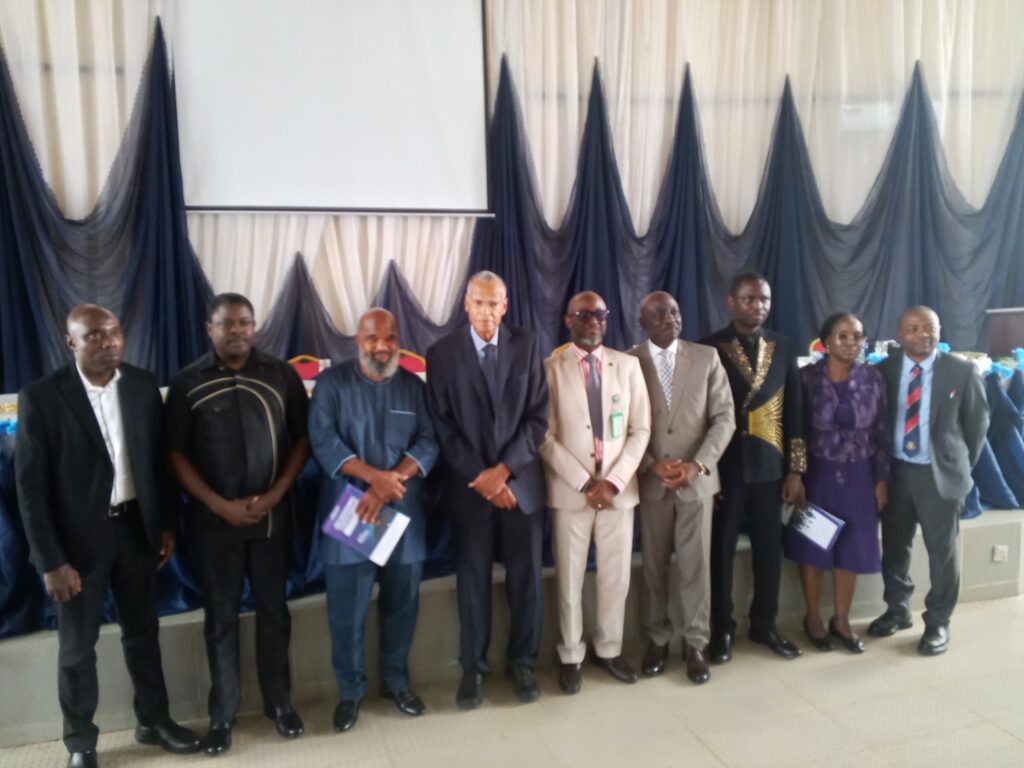
Despite significant challenges, the Club’s resilience has birthed innovations such as the Campus Doctor Blog, inaugurated in 1986 to educate the university community, both within and outside the College of Health Sciences, on health-related issues and topics of public health significance. It also established a Memorial Essay Competition in honour of the late Prof. Olufisan O. Taiwo, a former Editorial Board Chairman of the IFEMED Journal Club, who passed away in 2002; the Prof. Olikoye Ransome-Kuti Memorial Lecture and Essay Competition; and mentorship programmes that nurture future researchers.
Each year, the Club trains students to interrogate public health issues, translate complex research into narratives that matter, and publish findings that reflect the realities of healthcare in Africa. Through workshops, writing clinics, and peer-reviewed journals, it cultivates a culture of evidence-based thinking that bridges theory and practice.
However, perhaps what makes IFEMED’s legacy most profound is its connection to one man whose name still carries weight in Nigeria’s health history: Professor Olikoye Ransome-Kuti, a physician and Nigeria’s Minister of Health from 1985 to 1992, revered for his work in child immunisation, tackling the HIV/AIDS epidemic, and widely recognised for pioneering primary healthcare reform in Nigeria long before it became a global catchphrase through community-based interventions, universal immunisation programmes, and strong preventive medicine policies.
To honour the legacy of Professor Olikoye Ransome-Kuti, a paediatrician and former Nigerian Minister of Health, the IFEMED Club hosts the ‘Late Professor Olikoye Ransome-Kuti Memorial Essay Competition’ every four years, which was first held in 2004. Five more editions have been held since then in 2008, 2012, 2016, 2021, and 2025, respectively, as part of its flagship events and memorial lectures, thereby reinforcing the connection between student research, public health advocacy, and the ideals—not as a ritual of nostalgia but as a living dialogue between past ideals and present realities.
Through the lecture and accompanying essay competition, the Club invites students to confront today’s public health challenges with the same courage and clarity that Prof. Olikoye Ransome-Kuti embodied. In this way, IFEMED isn’t just reflecting on history; it’s extending it. Each publication and each conversation is a small act of continuity, proof that the pulse of OAU’s medical community still beats to the rhythm of inquiry, empathy, and reform that Prof. Olikoye Ransome-Kuti began.
6th Edition of the Professor Olikoye Ransome-Kuti Memorial Lecture
The lecture commenced on Thursday, October 30, with the recitation of the National and University anthems, followed by a welcome address from the Chairman of the occasion, Professor Roger Makanjuola, former Vice-Chancellor of OAU and CMD of OAUTHC. In his speech, Professor Makanjuola acknowledged that the late Professor Olikoye Ransome-Kuti made significant contributions to the health sector in Nigeria and indeed worldwide.
He also mentioned that the Ransome-Kuti family is known for its contributions to art, religion, education, and medicine—Mrs Olufunmilayo Ransome-Kuti (mother), who stood against colonial rule in Nigeria, and Fela Anikulapo Kuti (brother), a musician who fought against corrupt government.
The Olikoye Ransome-Kuti Memorial Lecture was also graced by several dignitaries, including the Representative of the Coordinating Minister of Health, Professor John A.O. Okeniyi (CMD, OAUTHC), Professor K.T. Ijadunola, Professor Bernice Adegbehingbe (Provost, College of Health Sciences) represented by Professor Oluyomi Okunola (Deputy Provost), Prof. Macellina Yinyinade Ijadunola, Dr Taiwo Fasoranti (Secretary to Ondo State Government) represented by Dr Michael Olumide Gbala (Chief Medical Director, University of Medical Sciences Teaching Hospital Complex, Ondo), Professor A.A. Salako (The Dean) represented by Dr Muzamil Olamide Hassan, Professor Adesegun Fatusi (The Board Chairman) represented by Dr Olujide Arije, and Dr Dotun Ransome-Kuti (representative of the Ransome-Kuti family). Additionally, medical students from Ladoke Akintola University, Obafemi Awolowo University, University of Medical Science, Ondo, and the University of Maiduguri were present, along with students from Moremi High School, Vickayor Private School, and Obafemi Awolowo University International School.
The keynote speaker, Professor K.T. Ijadunola, a Nigerian physician and Professor of Public Health and Community Medicine with 30 years of national and international experience, was the fourth Vice-Chancellor of Elizade University, after holding senior academic positions at Obafemi Awolowo University. The keynote lecture, ‘Reversing the Exodus: Retaining and Empowering Nigeria’s Healthcare Workforce’, delivered by Professor Ijadunola, was both detailed and insightful.
In addressing the theme, Professor Ijadunola mentioned that thousands of medical professionals have fled the country to other nations, such as Saudi Arabia, the United States of America, and the United Kingdom, in search of a better life for themselves and their families.
He stated that the high levels of poverty, insurgency, political instability, unemployment, and corruption have significantly contributed to the ongoing migration and economic effects in Nigeria. He explained the three phases of emigration that Nigeria has witnessed: the first was characterised by individuals migrating overseas to further their education and then returning to Nigeria to either join the government workforce and impact others with their learning or to join the private sector.
The second phase was characterised by Nigerian citizens moving abroad not just for educational purposes but to be joined by their spouses and settle in the Western world. The third, which is the current phase, constitutes a large percentage of the labour force in Nigeria fleeing to foreign countries such as Australia, Canada, Germany, the United States, and the United Kingdom to secure a better life, as the economy in Nigeria is not encouraging.
The problem of under-appreciation of skills, the high cost of living, lack of basic infrastructure, and low standards of living have also contributed to the ‘Japa Syndrome.’ He added that many Nigerian workers who took loans to build houses could no longer service those loans, and the threat of becoming homeless drove them to flee the country in search of better means of livelihood.
He concluded his speech by proposing solutions to drastically reduce the number of workforce emigrants. He suggested that, aside from salaries, workers should be given incentives, as this would serve as a means of encouragement. Additionally, scholarships and maintaining a stable exchange rate will certainly make life easier for Nigerian workers.
Dr Dotun Ransome-Kuti, son of the late Professor Olikoye Ransome-Kuti and representative of the family, gave a personal reflection on the legacy and enduring impact of Professor Olikoye. In his speech, he stated that his father was honest, trustworthy, and disciplined. ‘In everything you do, ensure you are the best,’ were the words of my father, he said. ‘No one in this country is as honest and transparent as my father was,’ he added. Dr Dotun Ransome-Kuti concluded his speech by expressing his appreciation to the IFEMED Journal Club and the entire gathering for honouring the legacy of his father.
Following the family tribute was the award presentation. The 2025 edition not only honoured the legacy of the late Professor Olikoye Ransom-Kuti but also presented an Award of Excellence to Dr Kuti Raymond Abiodun and Dr Babatunde Adetunji. These individuals are known and widely respected as visionary leaders and advocates for healthcare excellence in Nigeria. Dr Kuti Raymond Abiodun, a graduate of Obafemi Awolowo University, is a highly accomplished Consultant General Radiologist with over 30 years of clinical, academic, and administrative experience. He is a member of several prestigious international bodies, including the American College of Physician Executives and the American Institute of Ultrasound in Medicine, among others.
He has also contributed significantly to the medical profession through extensive publications in peer-reviewed journals and active involvement in both undergraduate and postgraduate medical education. He sits on the board of NGOs such as The Cerebral Palsy Centre and The Educators and serves as Chairman of the Board of Trustees of Lighthouse Christian Centre, Lagos.
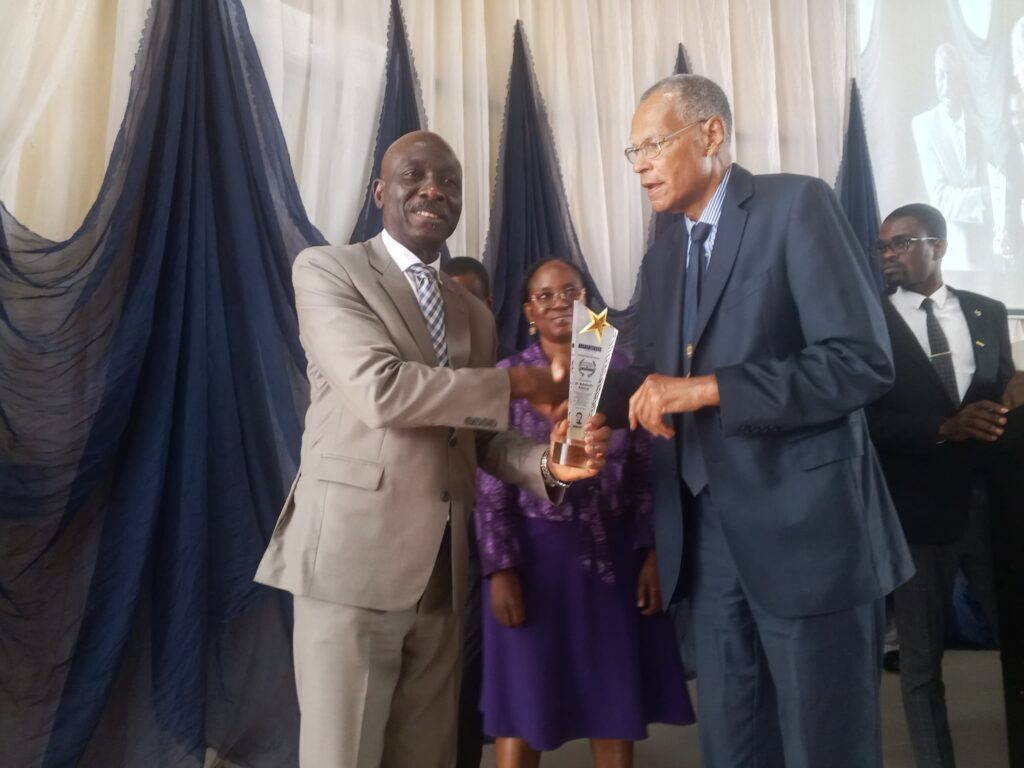
with Prof. Roger Makanjuola
Dr Babatunde Adetunji (M.D., M.A., M.S., D.Psych., D.Psych.Med., D.A.B.P.N., D.A.B.P.M., D.F.A.P.A., F.A.S.A.M., F.C.P.P.) is a psychiatrist and academician who holds triple board certification in General Psychiatry, Forensic Psychiatry, and Addiction Medicine. He is the President and CEO of The Executive Centre for Psychological Medicine in Voorhees, New Jersey, and the President of the IfeMed Alumni—North America Chapter. Dr Adetunji is a Clinical Associate Professor of Psychiatry at the Drexel University College of Medicine, a Fellow of the American Society of Addiction Medicine (F.A.S.A.M.), a Fellow of The College of Physicians of Philadelphia (F.C.P.P.), and a Distinguished Fellow of the American Psychiatric Association (D.F.A.P.A.).
6th National Olikoye Ransom-Kuti Memorial Essay Competition
The 6th National Olikoye Ransom-Kuti Memorial Essay Competition, organised by the IfeMed Journal, invited medical and health science students across Nigeria to engage in critical discourse on pressing global health issues. The 2025 theme, ‘Global Health Workforce Migration and its Impact on the Nigerian Health Sector: Challenges and Mitigation Strategies,’ challenges participants to explore the dynamics of healthcare brain drain and propose sustainable solutions for strengthening Nigeria’s health system. With over 200 participants from universities and colleges of health science throughout the country, the essay competition inspires young scholars to pursue excellence and innovation in healthcare. The top ten finalists of the 2025 essay competition are as follows:
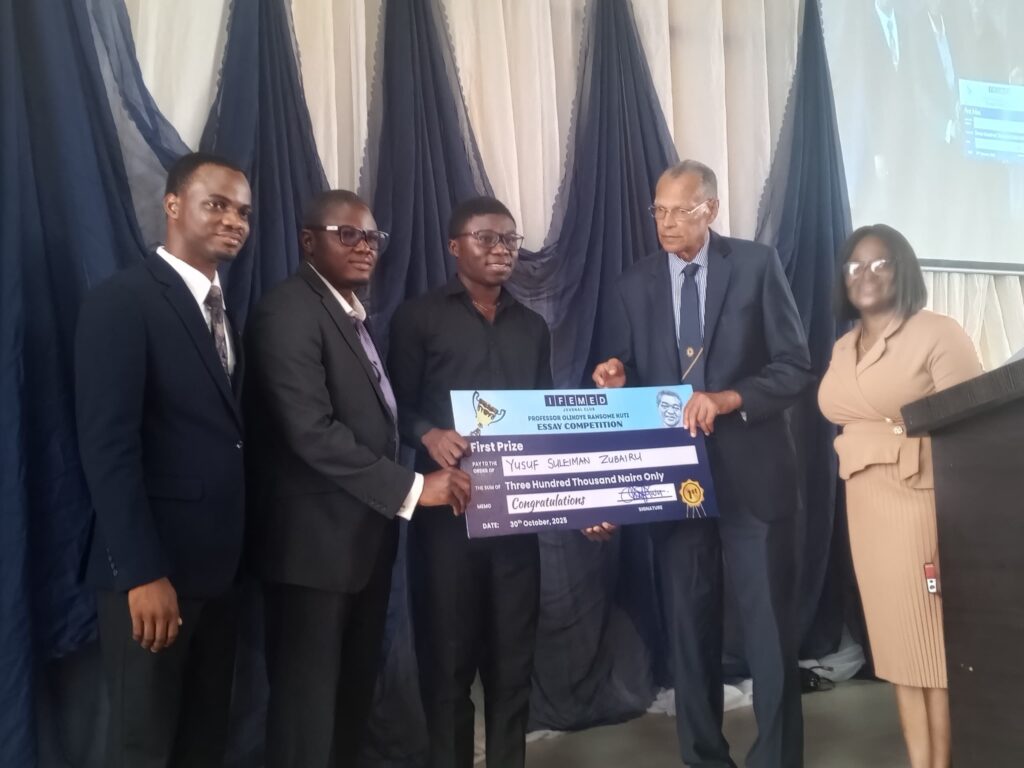
– Yusuf Sulaiman (Ahmadu Bello University) — Winner
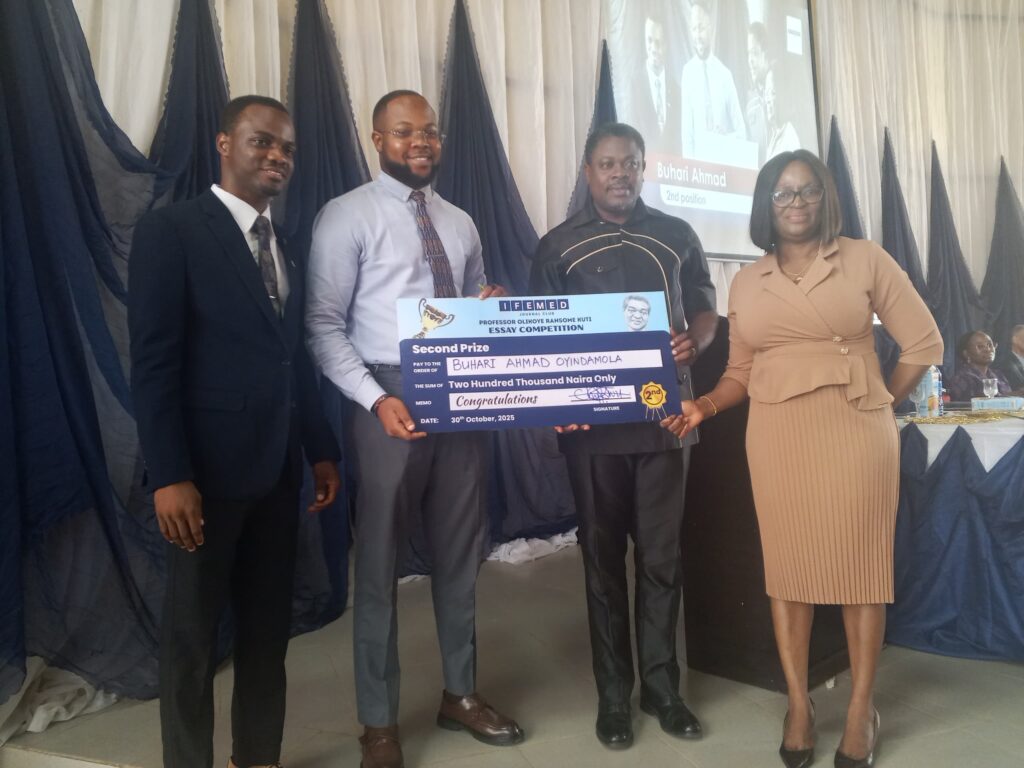
– Buhari Ahmad (University of Ilorin) — 2nd Place
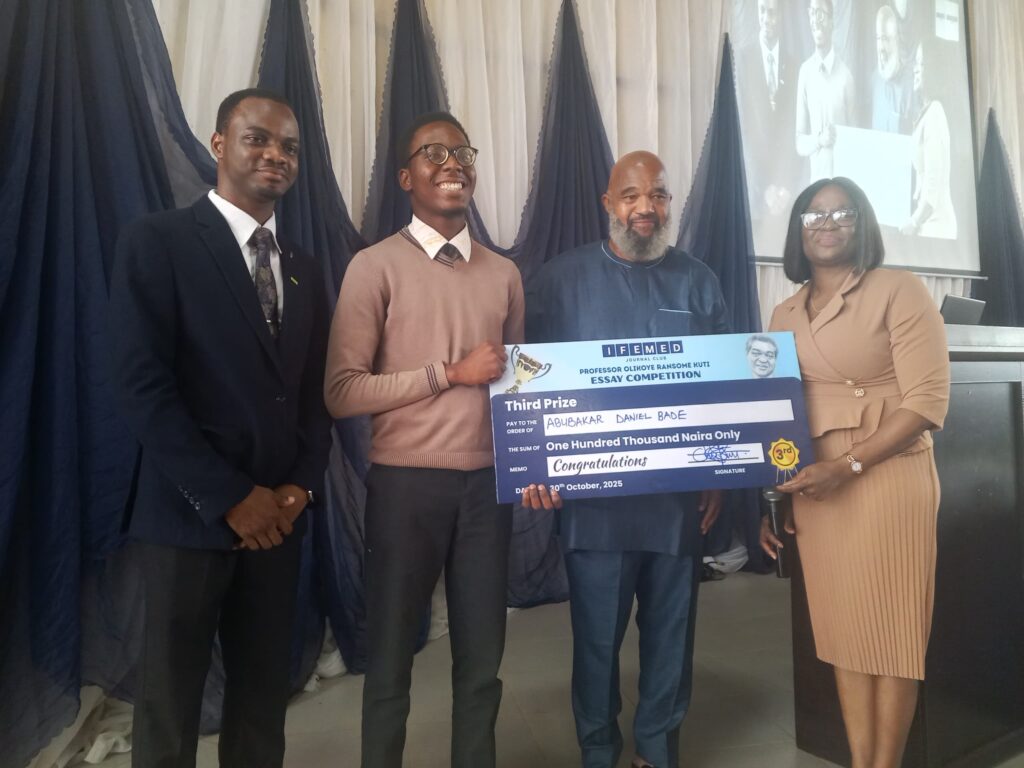
– Abubakar Daniel (University of Maiduguri) — 3rd Place
– Abegunde Moses (University of Benin)
– Boladale Zainab (University of Ibadan)
– Adeleke Oluwasegun (Obafemi Awolowo University)
– Anselm-Ahman Loveson (University of Jos)
– Ayoola Ayodeji (University of Medical Sciences, Ondo)
– Mudasiru Olamide Roqeeb (Ladoke Akintola University of Technology)
– Ugor Benedict (University of Ibadan)
The 1st, 2nd, and 3rd winners received ₦300,000, ₦200,000, and ₦100,000, respectively, while the other seven finalists were awarded ₦50,000 each. The finalists shared their experiences with ACJOAU in their interviews. Adeleke Olusegun (Obafemi Awolowo University), who was pleased to be one of the runners-up, said, ‘The essay competition serves as a platform to explore and put my writings and ideas out there, and being one of the finalists encourages me to do more.’ He also encouraged all writers to explore and research, enabling him to share his insights on certain issues.
Abegunde Moses, who represented the University of Benin, also mentioned that when he saw the flyer for the essay competition, he read about the life and legacy of the late Professor Olikoye Ransom-Kuti, and he was inspired by him. As a young medical student, Moses, who has been motivated by the legacy of this great man, encourages all medical practitioners to utilise the resources available in Nigeria to make the country’s healthcare sector usable and beneficial for all, as this was previously accomplished by the late Professor Olikoye.
The very first winner of the Olikoye Ransom-Kuti Memorial Essay Competition, Dr Temitope Ojo, who won in the first edition in 2004, was at the 2025 event to congratulate and encourage all the finalists, as well as all young medical students, to strive for excellence.
Some of the guests also shared their key takeaways from the event. While some mentioned that the late Professor Olikoye Ransom-Kuti’s quote, ‘In all that you do, make sure you are the best,’ was enough to inspire them to become better students, others claimed that the entire lifestyle and legacy of this esteemed man shall serve as a model for them to improve Nigeria’s healthcare sector, ensuring that no one feels the need to seek medical assistance outside the country.
The 2025 Memorial Public Lecture concluded with a vote of thanks and appreciation by the Editor-in-Chief of the IfeMed Journal Club, Chukwuma Chukwunonso, who also emphasised that the role of youth in sustaining the future of healthcare in Nigeria cannot be overemphasised. He acknowledged the principal officials of the University, including the Vice Chancellor, Professor Simeon Bamire, and the Deputy Vice Chancellor, Research and Development, Professor Akinyemi, as well as the College leadership—Professor Bernice Adegbehingbe, Provost of the College of Health Sciences, and Professor Salami, Dean of Clinical Sciences at Obafemi Awolowo University—for their unwavering support.
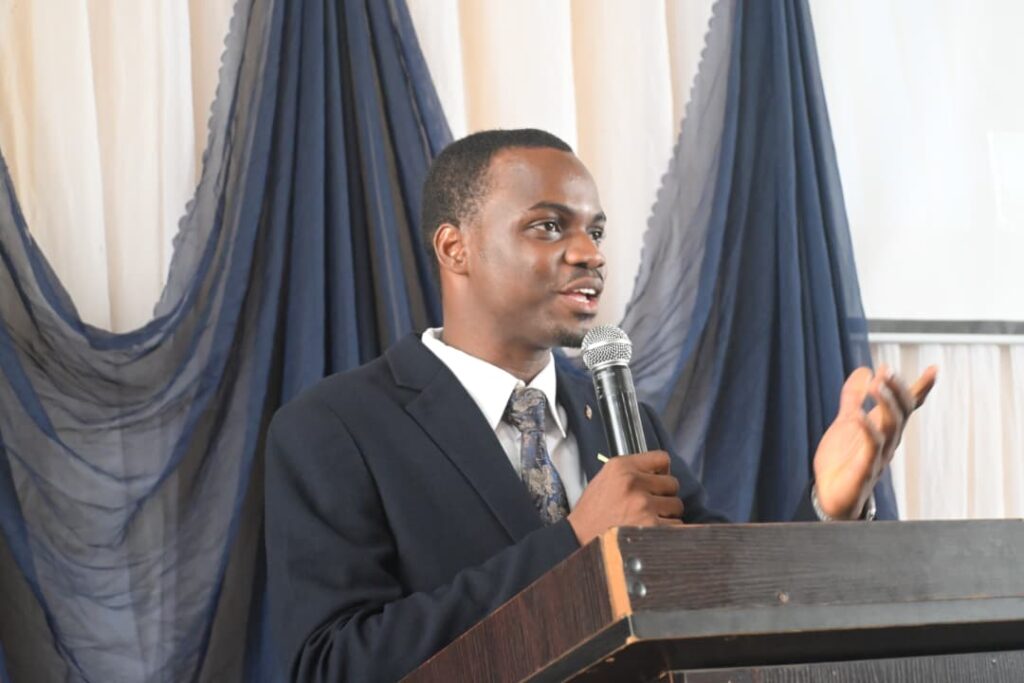
He concluded by expressing special appreciation to the Ransom-Kuti family for their presence and support towards the programme. He also thanked the keynote speaker, Professor K.T. Ijadunola, and all the guests of honour present at the event. ‘As we conclude the 6th Olikoye Ransom-Kuti Memorial Lecture, I wish everyone a safe journey home,’ he concluded.

